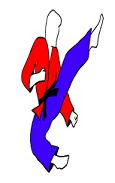Positive body changes
After about three weeks of true martial arts training, a wide range of physiological changes take place. Practitioners will exhibit improvements in blood sugar, blood pressures, blood lipids, brain neurotransmitter balance, blood supply to muscles, and capacity of somatic muscles and the liver to store carbohydrate in the form of glycogen, calcium metabolism and other basic parameters. The changes are not mutually exclusive; interactions among systems and their functions are the rule.
These changes translate into better functioning of the body and brain, and overall risk reduction for such diseases as hypertension, type 2 diabetes, coronary heart disease, chronic respiratory disease, osteoporosis, obesity, anxiety states, mild to moderate mental depression, chronic fatigue, and breast and colon cancers. An increase in breathing exercises and forms training helped me recover from type 2 diabetes and I am no longer insulin dependent because of it.
The brain and nervous system.
Martial arts training brings about remarkable changes in brain chemistry. The concentrations of various neurotransmitters that are responsible for facilitation or inhibition of nerve impulse transmission in the central nervous system -- acetylcholine, norepinephrine, serotonin, dopamine, gamma amino butyric acid (GABA), glutamic acid, endorphins and others -- are changed so that a new balance is attained. The clinical signs and symptoms that ensue are easier to record than the actual neurotransmitter levels, and many studies are in agreement on the emotional, behavioral and physiological changes that accompany martial arts training. A few recent investigations, however, have pinned down the neurochemical changes, as well. Eighty-nine year old Grand Master Yong Woo Lee, founder of JungDoKwan Taekwondo credits his years of martial arts training for his good health and mental sharpness at his age.
Among the early changes seen when individuals engage in a martial arts training program are mood elevation, heightened energy levels, enhanced self-confidence and self-esteem, lower anxiety levels, resistance to depression and improved coping ability. Changes in blood pressure and heart rate, which are, to a large extent, mediated by the central nervous system, occur soon afterward. Heart rate is slowed, and hypertensive blood pressure (systolic and diastolic) is reduced toward normal. Hapkido Grand Master Gary Pointer says: "Martial arts training keeps me going strong with a smile on my face! It is the ultimate mental and physical health program."
These physiological changes are a function of the rebalancing of the sympathetic (fight and flight) and parasympathetic (rest and repair) halves of the autonomic nervous system. Studies by the Inchon Sports College of Korea have found increased parasympathetic tone in martial arts trained subjects, and ascribe the slowing of heart rate and reduction in blood pressure to this increased tone. Others have recorded lower plasma catecholamine levels associated with lower blood pressure following martial arts training. Resting heart rate is largely controlled by the parasympathetic fibers of the tenth cranial nerve (vagus) to the heart's pacemaker (SA node). But blood pressure is much more complex, and more body chemistry, especially hormonal chemistry, is involved. The bottom line is that martial arts training reduces hypertensive blood pressure, and that the response is distance/intensity-graded.
Excerpt taken from http://www.fightingmaster.com/articles/medicine/medicine.htm
Wednesday, November 4, 2009
Followers
Blog Archive
-
▼
2009
(59)
-
▼
November
(21)
- What does it mean to be a Black Belt Leader? http...
- 10 year old boy stops 3 bullies - http://ping.fm/L...
- 10 year old boy stops 3 bullies
- Our Dover academy is getting a new floor thanks to...
- When your children meet your adult friends, do the...
- Question-what is the one thing the entire family c...
- Question - What's the one thing families can do to...
- Happy Thanksgiving to all of our great students. ...
- Martial Arts training bonds families and creates g...
- Martial arts training bonds families.
- Parents-in just 28 minutes we can show you a drama...
- 28 Minutes could change your life! http://ping.fm/...
- 28 Minutes could change your life!
- We love push ups!
- Look out! Here comes the boot to the head.
- Martial Arts are good for the body and brain.
- Martial arts training against dogs???
- So, you don't think you need self-defense???
- Our students are real community leaders
- Matthew Stiles demonstrates his leadership through...
- Our students are great leaders.
-
▼
November
(21)
